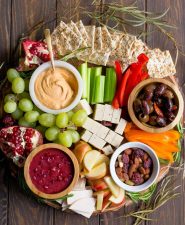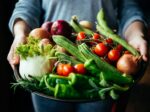 The Plant-based diet is big news now and there is no doubt that the message it promotes, to increase our intake of fruit and vegetables, breads and cereals, is good for our health.
The Plant-based diet is big news now and there is no doubt that the message it promotes, to increase our intake of fruit and vegetables, breads and cereals, is good for our health.
However just how healthy are some of the commerially prepared snack foods being generated under the plant-based banner?
A quick look around the supermarket and you’ll see new snack items popping up in nearly every aisle and targeting the needs of every age group from babies,to school children and adults.
New crackers, packets of crisps, puff snacks, muesli bars, biscuits, bakes and pouches. Alongwith an emphasis on vegetarian and vegan branding there is also a much wider use of ancient grains, chia seeds and quinoa also the use of lentils, fava beans, corn, hemp, seaweed and rice, than ever before.
Some of this diversity is being driven by the food sensitivity/ diet market with a wider range of foods available that are more clearly labelled, gluten, dairy, egg, sugar and soy free etc than in the past. This extra labelling is a useful tool for those affected however care still needs to be taken if selecting these snacks. E.g.Gluten free foods can be very low in dietary fibre, high in sugar and salt.
In many cases the packaging and price tag of snacks is adding another dimension to the product range. An air of exclusivity, luxury and sophistication. This converts some snacks into a novelty food to take to a party, add to a gift basket or offer at business drinks rather than something you might pop into your child’s lunch box each day.
What makes a good snack?
Does age or need come into it?
A good universal snack should be healthy, nutritious, quick to prepare, easy to transport and eat, accessible, inexpensive and if part of a plant-based diet should also be as ‘real’ (i.e as least processed) as possible.
In reality the many commercially available snacks foods sold today contain highly processed carbohydrates (of high glycaemic index) which are quickly absorbed, have miniumal dietary fibre so are not filling but do stick to teeth and gums increasing the risk of dental caries.
Snack foods that are puffy or light in weight may seem to parents as insignificant and just a bit of fun, keeping their child up with what other kids may be taking to school and kindy.
However if eaten everyday many of these snack foods can contribute a significant amount of kilojoules, added sugar, saturated fat and food additives, (particularly salt) to the diet. They can also displace nutrients essential to growth, mental and physical performance and increase the risk of obesity and type 2 diabetes. Take a look at some of these foods now on offer in local supermarkets
A Nutritional Comparison of a Selection of Commercially Available Snack Foods Found in New Zealand Supermarkets
| Food per 100g | Energy | Protein | Carbohydrate | Fat | Dietary fiber | Sodium |
| kJ/kcals | g | g | g | g | mg | |
| Puffs | ||||||
| NZ Quinoa Co® Quinoa Puffs | 1700/406 | 13.9 | 48.1 | 15.8 | 8.9 | 465 |
| Pams® rice snacks | 1610/385 | 8.8 | 83.4 | 0.9 | 0.7 | 600 |
| Baby Bellies®Organic blueberry puffs | 1870/447 | 6.5 | 74.1 | 13 | 2.1 | 8 |
| Crackers | ||||||
| Hello Raw® carrot & cashew | 527/126 | 4.4 | 10.6 | 6.5 | 3.9 | 107 |
| Trail Mix® Crackers | 2079/497 | 15.4 | 56.2 | 23.4 | N/A | 284 |
| Ceres Organic® Brown rice crackers | 1610/308 | 6.8 | 71.6 | 7.6 | 4.3 | 558 |
| Health Discovery® hemp crackers | 2330/557 | 17.7 | 20.1 | 45.5 | 12.8 | 147 |
| Little Quacker® rice biscuits | 1663/397 | 5.8 | 91.9 | <1 | N/A | 319 |
| Crisps | ||||||
| Sunbites® Grainwaves | 2110/504 | 7.9 | 64 | 23.6 | 2.8 | 393 |
| Pams®Potato sticks | 2130/509 | 5.3 | 56.7 | 29 | N/A | 613 |
| Eat real® veggie straws | 2168/518 | 3.1 | 62 | 29 | 3.1 | 385 |
| Nature fd® Jasmine Brown rice chip | 1950/466 | 10.7 | 55.7 | 20.2 | 8.4 | 476 |
| Nature food co® Hummus chips | 1940/464 | 12.6 | 55 | 21.4 | 6 | 482 |
| Maretti® Bruschette chips | 1910/456 | 9.1 | 71 | 14 | N/A | 800 |
| Wholesome food® Falafel chips | 2149/514 | 9.7 | 59.9 | 26.1 | N/A | 370 |
| Piranha® Snaps with probiotics | 2080/497 | 4.1 | 55.8 | 27.4 | 5.6 | 670 |
| Wellabys®Lentil chips | 1649/394 | 18.5 | 68 | 4.1 | 3.3 | 1370 |
| Snacks | ||||||
| Wellabys® Simple bakes | 1898/454 | 6 | 83 | 9.5 | 4.2 | 2200 |
| Sweet As® Popcorn | 1750/418 | 10.9 | 46.7 | 18.2 | N/A | 313 |
| The Food of Athenry® Cookie shots | 1910/456 | 3.5 | 58.7 | 22.5 | 2.5 | 120 |
| Think food® Munch Flax, sesame. | 2480/593 | 19 | 33.3 | 42.9 | 11.8 | 222 |
| Ceres Organic® Seaweed snack | 2300/550 | 25 | 13 | 36 | 20 | 2300 |
| Little Bellies®Organic animal biscuits | 1850/443 | 8.4 | 67.9 | 13.9 | 5.1 | 320 |
| Raffertys Garden®Snack bar apple | 1480/353 | 5.5 | 62.1 | 7.1 | 3.5 | 235 |
Ref: Food works 10,2019
Safe Snacking
Keep an eye on the salt content in the snacks you buy
- In excess, sodium can weaken bone, increase blood pressure and the risk of stroke.
- Not all snack foods promoted for baby’s have lower sodium levels. (Ref chart above) and it is very easy when eating around adults to offer a standard rice cracker or crisp to a child without any thought to the fact that their sodium needs may be a lot less than an adults.
- Sodium should be listed in milligrams yet when compiling this list of snack foods I noticed that some manufacturers reported sodium in grams e.g. 2.2g making the sodium appear smaller than its actual 2200mgs.
- Check the table below to note the sodium intake recommended for your age group.
Australian and NZ Nutrient Reference Values for Sodium
| Age | Sodium recommendations per day |
| 0-6months | 120mg |
| 7-12months | 170mg |
| 1-3 years | 200-400mg |
| 4-8 years | 300-600mg |
| 9-13 years | 400-800mg |
| 14-18years | 460-920 mgs |
| Adults | 460-920mgs |
NB: These levels do not allow for highly active individuals such as endurance athletes or those undertaking heavy physical work in hot climates. Talk to me about sweat loss testing.
Don’t leave young children unattended when eating
- Whole pieces of raw fruit and vegetables and snack foods such as rice crackers and chips or nuts can become lodged in their throats causing choking.
- Supervise childrens eating and encourage them to sit down to eat as running with food in the mouth can be dangerous if they trip and fall
- Refer to The Ministry of Health guidelines on choking prevention for more information.
Avoid food spoilage
Particularly over summer months ensure that snack foods and lunches are in well sealed containers. Adding a frozen drink bottle can help to keep protein rich foods such as egg, cheese, meat and beans from deterioating in the heat.
Snack Mindfully
Its very easy to eat while distracted such as when be watching TV, a movie or device. This will not satisfy your hunger but will expand your waistline if it leads to binge eating.
Dental health
What ever your age it is important to recognise the effects that fermentable carbohydrates, present in meals, snacks and some beverages can have on tooth enamel. Athletes in particular need to be aware of the corrosive action of sports drinks, gels and snacks on tooth enamel. See further reading below.
Plan to Snack
It was once thought that if you included a protein rich food at every main meal e.g. yoghurt, egg, cheese, beans, fish then these foods would take 3-4 hours to digest and therefore delay hunger until the next meal.
This is still true however our day might not go to plan:
- We get stuck in a meeting or traffic and miss lunch
- We get asked to play back to back netball
- Lunch gets left at home
- You’re a child and in the middle of a growth spurt and need more to eat
- Someone at work is sick and you get asked to work through a meal break
Healthy snack foods can provide a good backstop to maintain your energy stream without spoiling your next main meal if you just give it some thought.
Tip: If you need food on the run, buy a protein filled sandwich, roll or wrap e.g. egg or cheese based (buy two if necessary) rather than dipping into the snack box or vending machine at work
Examples where a healthy snack could come in handy:
- Construction workers, builders and subcontractors
If you replace the sausage rolls, cream buns and pies at smoko with filled rolls, wraps and sandwiches you can maintain your energy and its kinder on the heart too - Athletes can enhance their performance and build a stronger body when they learn what to eat before, during and after exercise for better recovery.
- Elderly people or those struggling to maintain a healthy weight can benefit by having a pre-breakfast snack (such as a muffin or pikelet) with their first cup of tea for the day if they wake up early.
- Travellers: Stopping for a morning or afternoon tea break if on a long trip can result in better road safety than if driving too long snacking on lollies and soft drink.
In search of healthier snack foods
Whole foods can make the healthiest snacks and if based on fresh fruit and vegetables, bread or cereals they can be inexpensive too. See suggestions below
Healthy Snack Foods
| Food/100g | Energy | Protein | Fat | Carbohydrate | Dietary fibre | Sodium |
| Cheese (30g) and pineapple (50g) on sticks | 693/165 | 10.8 | 10.1 | 7.1 | 1.3 | 289 |
| Apple | 269/64 | 0.2 | 0.6 | 12.9 | 2.7 | 0.9 |
| Berry and banana smoothie | 240/57 | 2.3 | 0.8 | 9.3 | 1.3 | 19.3 |
| Celery stix (2) gucamole 2Tb | 498/119 | 1.1 | 11.9 | 1.3 | 1.7 | 29.8 |
| Yoghurt, fat reduced, unsweetened | 170/40 | 4.8 | 0.4 | 4.4 | 0.3 | 48 |
| Raisins | 1249/298 | 3.2 | 0.5 | 66 | 4.9 | 10 |
| Carrots raw (2 whole) hummus 2Tb | 224/53 | 1.6 | 1.1 | 7.5 | 3.3 | 82 |
| Muesli Bar | 1758/419 | 3.9 | 19.8 | 54 | 3.9 | 91.5 |
| Cheese slice (20g) on wholegrain toast (1) | 1231/294 | 16.7 | 11.5 | 28 | 4.5 | 754 |
| Air popped popcorn
no butter, sugar & salt added |
1445/345 | 13 | 4.5 | 55 | 14.5 | 8 |
| Mixed nuts, dry roasted, unsalted | 2599/621 | 17.4 | 55 | 10.9 | 7 | 7.6 |
| Ryvita (2), ricotta cheese (2Tb) tomato (1/2) | 526/125 | 5.7 | 4.8 | 13.3 | 2.8 | 121 |
| Muffin, berry | 1535/366 | 4.1 | 18 | 45 | 2.3 | 240 |
Ref: Foodworks 10, 2019
Note: To keep comparisons fair all figures are in 100g servings however do note that:
- 1 cup Air popped corn may only weigh 10g
- Raisins can be bought in 14g and 30g packs
- While nuts are healthy if body weight is an issue for you keep nuts to no more than 30g servings per day.
- If baking, keep muffins small to 50g servings
When you view snack foods as part of your whole days food intake then there is less danger of overeating and more opportunity to learn how to really power up your day. If you need help with it’s design then contact us today.
References:
- Foodworks Xyris 2019
- Australian and NZ Nutrient Reference values. https://www.nrv.gov.au
- MOH guidelines on choking prevention
For more articles by Lea on similar topics:
How to make the most of the plant-based diet
6 Tips for helping athletes eat more plant foods
Get into fruit and vegetables for optimal health
How to put real flavour into your cooking
Feeling full is the secret to weight loss
Muesli bars can aid performance
Sugar control is essential to better health
Teenagers-they rove-eat-sleep and grow!
Athletes protect your winning smile
Dental health focus
































































Leave a Reply